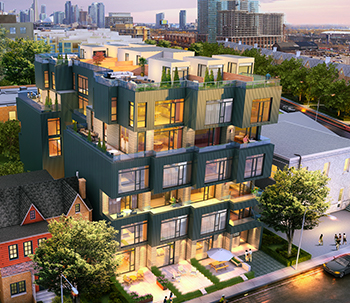
David Moses was the keynote speaker at Laurentian University’s McEwan School of Architecture on March 21, 2018 at the Work on Wood (WoW) event. The presentation was titled “The Future of Building: Wood and the Carbon Neutral Pathway.” David tied together the topics of carbon, wood buildings and more specifically, tall wood buildings.
WoW was a full-day event featuring speakers from forestry, forest products research, and wood architectural design and education.
David focused on the vision for the future of construction:
We’re at the leading edge of a complete change in the way we build. With prefabrication, the construction site is now the factory, producing quality, high performance buildings at top speed. Prefabrication is the quietest, safest and cleanest construction site you have ever experienced.
A key feature of this new building system is materiality – mass timber replaces most of the concrete and steel typically used in construction. Mass timber is sustainably harvested, machine stress-graded and precision machined. However, there are some challenges our industry must overcome before we can make this leap. Some of the logistical hurdles include:
- Training: A new generation of architects, engineers and builders will need to shift their thinking around these ideas.
- Simulation: Technology companies for construction sequencing simulation will need to develop and evolve.
- R&D: Research and develop will continue to create new products, new systems and simulation interfaces.
- Codes and standards: Building codes are extremely slow to adapt and will lag behind industry practice for many years.
- Supply chain: New suppliers will need to enter the market and develop products and just-in-time delivery practices. They will need to adopt the same simulation technology to match the systems used on site.
- Standardization: Confusion will arise since many structural system options are currently being considered
and, unlike other materials, mass timber dimensions vary between supplier.
The construction industry is slow to change. The risks of adopting new methods and practices will prevent the majority of building owners from being first adopters. There will be hurdles in the planning process, in procurement and at times it will seem that small steps are being made. But as with any new technology, the life cycle starts with the early adopters.
David noted the huge potential of this opportunity. For those who are just starting their career, and are passionate about change, about the environment, and want to make a lasting impact, this is an exciting space to get into.
Imagine a construction shift that will make a lasting impact on creating local jobs, improve working conditions, and have a positive environmental impact using a sustainably-harvested, low embodied energy material to create high quality, high performance buildings at top speed!






